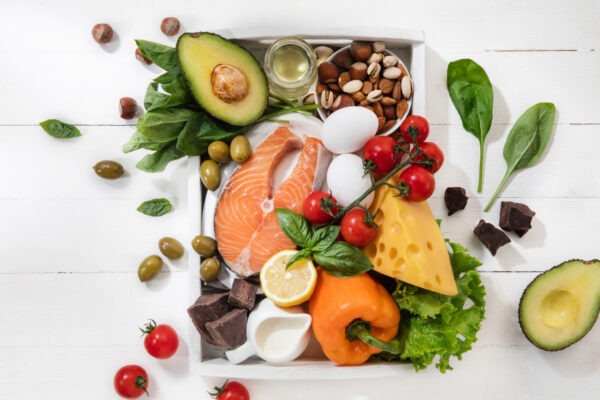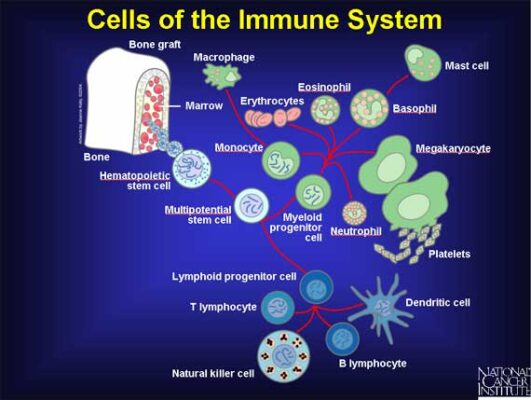Nutrition and Immunity – Relationship, Impact and How to Improve Your Immune System

The human body shares a powerful relationship with nutrition. Our immune system – the body’s defense mechanism against illness and disease – relies on nutrients found in certain foods to build and maintain that defense. Thus, what food and nutrients you put into your body are essential to your overall immune health.
Understanding the Immune System
Your immune system is a complex machine created to protect your body from illness and disease. A robust immune system can fend off viral and bacterial infections ranging from the common cold to chicken pox. However, when the immune system weakens, you may find yourself dealing with more frequent or prolonged illnesses.

Image by Jeanne Kelly, Public domain, via Wikimedia Commons
How Does the Immune System Function?
Your immune system functions as an intricate home security system. When a foreign presence (called antigens) enters the body, the immune system triggers the equivalent of a red alert. The immune system immediately starts producing antibodies against the infection via B Lymphocytes – also known as white blood cells.
Once the white blood cells begin antibody production, the immune system goes on the offensive. The antibodies locate and stick to the infection as a form of identification and targeting. The body then triggers T Cells to attack the located infection. The T Cells surround and absorb the antigens, releasing a chemical to destroy the infection effectively.
How Does the Immune System Protect the Body From Harmful Substances?
But, the immune system doesn’t stop with ending the infection. It continues to work to prevent future infections by the same virus or bacteria. The antigens will remember the infection and allow the body to fight it off faster in the future. The memory capability of antigens is why immunizations have become a key component in disease prevention. They allow the immune system to develop defensive measures against a pathogen by attacking harmless copies of the antigens held in the immunization.
Additionally, the immune system has a fantastic way of reducing the damage caused by toxic pathogens via a particular type of white blood cell called an anti-toxin. As their name suggests, anti-toxins work against harmful toxins some pathogens produce.
Common Factors That Weaken the Immune System
Immune systems are not immune to everything. Several factors can weaken the fighting power of your immune system, including:
Environmental Toxins
Toxins from smoke, pollution, or debris in the air can suppress your immune system, reducing its ability to fight off infections.
Chronic Diseases
Certain diseases target the immune system. These autoimmune conditions and immunodeficiency disorders can significantly weaken the immune system and make you more prone to developing other diseases or catching more illnesses. Examples of immune conditions include lupus, rheumatoid arthritis, and cancer.
Age
As we age, our immune systems weaken. Elderly individuals fall into the immunocompromised population.
Obesity
Excessively overweight individuals are prone to developing chronic inflammation. Higher inflammation in the body can result in a weakened immune system.
Chronic Stress
Stress plays a significant role in the strength of an individual’s immune system. For example, chronically stressed individuals may experience higher-than-average cortisol levels, a hormone that can suppress the body’s immune response.
Lack of Sleep
During sleep, the human body releases cells called cytokines that help fight infections. When you don’t get enough sleep, the body loses its ability to fight infections efficiently.
Poor Nutrition
Last but not least, poor nutrition and malnutrition can drastically impact your body’s ability to fight off infections.
The Impact of Nutrition on Immune Health
The human body relies on critical nutrients (vitamins and minerals) to maintain normal bodily functions, including those of the immune system. The best way to get those vital nutrients is by eating nutrient-rich foods.
But what about vitamin supplements? Today we have the luxury of purchasing nutritional supplements in powder, pill, or liquid form. However, vitamins and minerals are almost always most potent when consumed from fresh food. That said, there is a place for supplements in immune defense, particularly if you suffer from a vitamin deficiency or nutrient-deficient diet.
What Nutrients Help Maintain a Strong Immune System?
You’ve probably heard that Vitamin C is a critical nutrient for immune health. While that’s undoubtedly true, several other nutrients are essential in maintaining your immune system’s health. They include:
- Vitamin A
- Vitamin C
- Vitamin D
- Vitamin E
- Zinc
- Iron
- Protein
- Magnesium
How Do Nutrient-Deficient Diets Impact Immune Function?
Ultimately, when your body doesn’t get the nutrients it needs to maintain itself, bodily functions start to weaken. Without proper nutrition, the immune system runs without the fuel to produce antibodies and immune cells. As a result, a nutrient-deficient individual will experience more illnesses that last longer than an individual with a nutrient-rich diet.
Unfortunately, nutrient-deficient foods dominate Western culture. Highly-processed products like lunch meat, breakfast cereal, chips, white bread, and refined sugars are glaringly devoid of healthy nutrients. Thus, it’s not uncommon for individuals in Western countries to experience nutrient deficiencies.
The Role of Vitamins and Minerals in Supporting the Immune System
How does what we eat actually help the immune system? As previously mentioned, the nutrients in foods support and fuel the functions of the immune system. Nutrients like Vitamin C and Zinc help the body produce white blood cells and kill antigens. Other nutrients, like Vitamin E, can help repair damaged cells.
Foods to Boost Immune Health
Sometimes it may seem easier to take a multivitamin once a day to get your daily nutrient needs. But you must remember that the human body is designed to eat food and absorb nutrients from it – we aren’t designed to live off vitamin capsules. Your body functions best when consuming nutrient-dense foods. Plus, nutrients found in the food pack more punch than those in vitamins. If you want to add a natural boost to your immune system, look for these nutrient-dense foods on your next grocery run:
Fruits and Vegetables Rich in Vitamins and Antioxidants
Colorful (all-natural) foods usually equal vitamins and antioxidants – veggies and vibrant fruits offer up a multitude of vitamins, minerals, and antioxidants. Here are some examples of vitamin-rich fruits and vegetables:
- Broccoli – Vitamin C, Iron, Vitamin B
- Carrots – Vitamin A, B, and C
- Leafy Greens – Vitamin A, C, E, and K
- Sweet Potatoes – Vitamin B, Magnesium
- Oranges – Vitamin C and Folate
- Berries – Magnesium, Vitamin C, and Pre-biotics
- Bananas – Potassium and Magnesium
- Apples – Vitamin C and E
Lean Proteins to Support Immune Function
Your immune system requires protein to build infection-fighting cells. Lean protein supports the immune system (and other bodily functions.) Examples of lean protein include:
- Plain Greek Yogurt
- White fish (cod, snapper, halibut, etc.)
- Lean cuts of beef
- Chicken or Turkey
- Low-Fat or Fat-Free Dairy
- Nuts (walnuts, almonds, cashews, etc.)
Probiotic-Rich Foods to Enhance Gut Health
Surprisingly, a healthy gut helps to maintain your immune system. Your gut contains a complex ecosystem called a microbiome. What you eat decides the kinds of organisms that live in the microbiome. If you consume probiotic-rich foods, your microbiome will contain beneficial microbes that can help stimulate your immune system’s activity levels. Great sources of probiotics come in fermented foods like:
- Yogurt (less added sugar is better.)
- Kefir
- Kimchi
- Sauerkraut
- Pickles
- Kombutcha
- Cheese with “active” or “live” cultures – i.e., gouda, cheddar, and cottage cheese.
And Remember, Hydration is Key to Immunity!
Our body consists of 55-60% water, so it makes sense that our immune systems require hydration to function properly. White blood cells require lymphatic fluid, and lymphatic fluid requires water. Adult men should, on average, drink 15 cups of fluid a day, and women should consume at least 11.5 cups. That number increases if you drink diuretics like coffee or tea or if you are unwell.
Unfortunately, it’s extremely common for individuals to become dehydrated when unwell. Dehydration frequently occurs because, during periods of illness, the body needs more water than normal to replace fluids lost through congestion, sweating, vomiting, or other bodily functions.
6 Tips for Improving Immune Health through Nutrition
While you can’t control all the factors impacting your immune health, you can manage your nutrition to benefit your immune system. Here are six tips on improving immune health through your nutrition:
Eat a Balanced Diet
Your body relies on diverse nutrients to keep the immune system running well. By varying your diet with nutrient-dense foods like fresh produce, lean protein, and low-fat dairy products, you give your body more nutrients. Additionally, a balanced diet can help you reduce the impact of obesity on your immune health.
Practice Meal Planning and Preparation
Eating a balanced diet isn’t always as convenient as swinging through a Drive-Thru on lunch. Consider practicing weekly meal planning and meal prep to ensure your meals include fresh, healthy foods.
Take A Multivitamin Daily
Taking a daily multivitamin can help fill in any nutritional gaps you may unknowingly have. Many brands offer options tailored toward the dietary needs of men, women, pregnant women, and children.
Get Tested for Vitamin Deficiency
Speak with your doctor about nutritional concerns, and they may suggest you get tested for vitamin deficiencies. If you do have a vitamin deficiency, then you can consider addressing it through diet and supplements.
Consider Dietary Supplements
While dietary supplements should not replace a balanced diet, they can play a role in keeping your nutritional balance in check. However, keep in mind that dietary supplements are not regulated by the Food and Drug Administration and have very little regulation on their ingredients, potency, etc. Speak with your doctor about reputable dietary brands to consider using.
Avoid Nutrient-Poor Foods and Beverages
Part of a balanced diet includes avoiding nutrient-poor foods and beverages. These include highly-processed foods like cakes, sodas, syrups, jelly, fast food, chips, pretzels, and salad dressings. Highly-processed foods contribute to obesity and reduce your overall nutrition.
Conclusion
Your immune system needs beneficial nutrients to fend off and prevent infections and illness, but how well it does that will depend on your nutrition. Without key nutrients like Vitamin A, E, or C, your body will find itself fighting off invaders with a weakened immune system.
Ultimately, there’s some truth to the saying, “garbage in, garbage out.” However, in the case of your immune system, the saying goes, “nutrition in, nutrition out.” If you put good, healthy nutrition into your body, your body will reward you with a better-functioning immune system. By prioritizing a balanced diet full of nutrient-rich foods, you’ll help give your body what it needs to fight off infections and leave you feeling stronger and healthier overall.
Sources:
“Nutrition and Immunity” by Harvard T.H. Chan School of Public Health
https://www.hsph.harvard.edu/nutritionsource/nutrition-and-immunity/
“The Role of Nutrition in Immune Function” by Oregon State University
https://lpi.oregonstate.edu/mic/health-disease/immunity
“15 Foods That Can Boost Your Immune System” by Healthline
https://www.healthline.com/nutrition/foods-that-boost-immune-system
“Nutrition and Immune Function: Overview and Evidence” by Nutrients journal
https://www.ncbi.nlm.nih.gov/pmc/articles/PMC6723551/
How and why does diet influence immune function? By Medical News Today
https://www.medicalnewstoday.com/articles/how-and-why-does-diet-influence-immune-function
How to boost your immune system by Harvard Health Publishing
https://www.health.harvard.edu/staying-healthy/how-to-boost-your-immune-system
Nutrition and the immune system: an introduction by National Library of Medicine
https://pubmed.ncbi.nlm.nih.gov/9250133/
Nutrition by World Health Organization